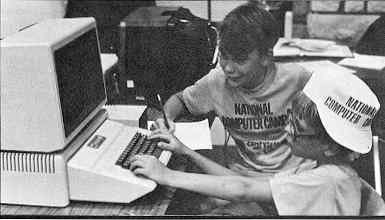
HOW TO SURVIVE
COMPUTER CAMP
by Robert Schwabach
Robert Schwabach writes a column on personal computers syndicated in forty-one newspapers. He has eleven computers and now has to move to a new house.
Hello, Fahdda;
Hello, Muhdda;
This is Harold's Liddle Bruhdda.
He is happy. Oh so happy ...
What with Apple and Atari and Camp Granada.
(With apologies to the late song comic Alan Sherman)
There was a time when survival kits for campers included such vital material as comic books, candy and flashlight batteries. Now kids at computer camp word-process letters to parents imploring them to send the latest issue of Byte, extra diskettes and rolls of quarters for the video games at the 7-Eleven.
Surviving computer camp is somewhat more complex for parents than for the campers themselves. Sending the kids to tennis or horseback-riding camp can be a lot easier and cheaper, but you wouldn't want to deprive them of the opportunity to take part in the computer revolution. Because, you see, there is a great deal of lambent anxiety in the land. The world is changing. The rules are changing. The future isn't what it used to be. Harold's Liddle Bruhdda, whose real name is Basil, will have to become technologically fast-moving and hip. (Dare we mention the fear that stalks the night? Computer illiteracy!)
So this is how it goes: if you want your kid to be with it, computer camp is where you'll send the wee tot come summertime. And you better get with it, too. The crush is on. You may not know a subroutine from a syntax error, but never fear. A little child shall lead you-and glad to do it, too.
Getting in touch is no problem. There are computer camp ads in the features section of every Sunday newspaper in the land. Then what? Well, make local inquiries. Find a neighbor, a friend, or call the computer department at the Old School for Learned Advice. Like the Packard automobile ads used to say: "Ask the man who owns one." Or it might be a good idea to get hold of a book on the subject.
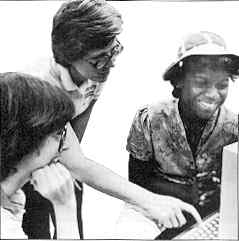
In computer camp, the councelor-student
ratio is an imprtant cosideration.
The information you need covers such crucial matters as which computer each camp uses. If Basil uses an IBM at home, it's not terribly efficient to send him to a camp that uses Apples. This would seem selfevident, but many parents suffer computerphobia (fear of being centrally processed) and it's amazing what they'll do under stress. A good way to prevent this error, and a good rule to follow in any case, is let the kids select the camp. They probably know more about it than you do.
The next matter of import is what language they speak at the camp. And I don't mean do they speak English? Rather, do they provide instruction in BASIC, Pascal, Logo or something truly out there in the blue like Ada or C?
Next you want to know the kid-to-computer ratio. Ideally you'd want it one-to-one (one kid, one machine), but there are varying schools of thought on this. Some people think a two-to-one ratio is better; often it's more fun for the kid to elbow back and forth with a camp buddy for time at the machine and to talk over what each one is trying to do. The operant theory here is that two kids interact with each other and with the machine, instead of little Basil turning into more of an eight-year-old recluse than he already is.
Some camps have age limits; others don't. Some are live-in and some are just day camps. Some permit parents to attend along with the kids if they want to, and at least one, Clarkson College in Potsdam, New York, insists that a parent attend with the kid.
Camps generally run one-, two- or three-week sessions, the first groups normally starting around the end of June. A fairly typical cost is $400 to $500 a week for a live-in camp, less than that for a day-camp arrangement. The so-called Original Computer Camp, which offers a deal that includes a trip to England and Scotland, will set you back about $3,000.
If it were me (and by golly it is-my kid is off at computer camp), I'd make my selection on what I could glean about who the counselors and teachers are, and then, if everything seemed okay there, where the camp is. Incidentally, a remote camp in the Arizona desert may not necessarily have a less competent staff than one by a college campus. For all you know, they could pull their staff from the vacationing faculty at Cal Tech.
There are plenty of computer camps all over the place. You'd think the computer manufacturers themselves would see camps as a natural tie-in to their business, and a way to get the little ones hooked on a particular machine they want to trade up for later on, but it hasn't worked out that way.
Missing from the field so far are specialized camps, a few of which are just now coming into existence. By specialized camps, I mean those aimed at teaching or advancing a particular skill-computer music, graphics or the highly sophisticated art of computer animation. Kids love this stuff, as is well evidenced by the leechlike determination they exhibit whenever they come upon someone who knows how to make that machine do songs or pretty pictures. But what I would expect in the very near future is camps specializing in just one area, rather than trying to do the whole circuit. Each one is complex enough to easily offer opportunities for specialization. The Math Workshop, College of Wooster (Ohio), is one of the few camps that specialize as of now.
Some camps (very few) offer some financial assistance for parents who can't afford the full fees. The Antioch College Computer Camp, in Yellow Springs, Ohio, is one of these. Rocky Mountain Computer Camps, of Boulder, Colorado, is another.
Names are not always a guide to what's going on, by the way. Try to decode the advertising claims by making some phone calls. What's a few bucks for rental of AT&T's long lines when you're about to spend hundreds on the enhancement of your heir and the relief of anxiety?
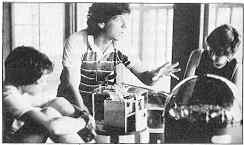
The first computer camp sets the stage for
many summers of exploration and learning.
| ADULT COMPUTER CAMPS Why should children have all the fun? Plush resorts allow adults to claim their own computer retreats, where keyboarding and surfboarding are equally accessible recreations. Club Med made headlines in 1982 by offering Atari computer installations as a come-on to guests at its pleasure compound on the island of Corsica. Since then, computer centers have opened in Guadeloupe and at Club Med locations in Mexico and the Bahamas. But the freeform French resort offers so many distractions it may be hard to concentrate on a screen. Closer to home, the over-twenty-one can enjoy computer how-to's and more advanced activities at such leisure spas as Jackson Hole Personal Computer Resort in Wyoming, Computers Simplified locations in California or Computer Country, in a trailer camp in Connecticut. Fees may run from $20 to $200 per day in addition to travel and lodging; but with a legitimate business need for computer education, your whole trip may be tax-deductible. Check with your accountant. Then phone your travel agent. 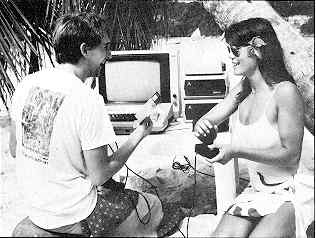 Sun, surf and computers becon today's adult vacationers. 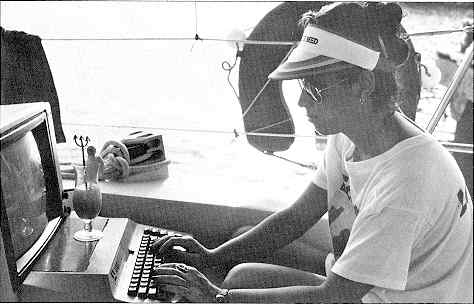 |
Return to Table of Contents | Previous Article | Next Article

